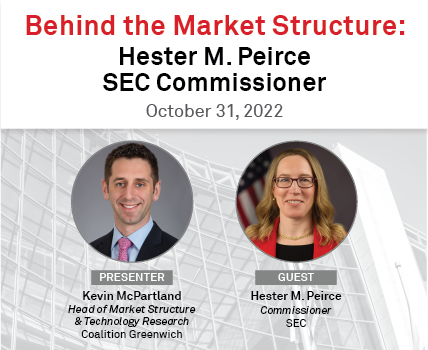Behind the Market Structure: Hester M. Peirce, SEC Commissioner
"It's important to allow the markets to work."
The extraordinary events and volatility of the past few years and months have prompted the Securities and Exchange Commission (SEC) to weigh in with proposed regulations on everything from fixed-income trading venue oversight to environmental, social and governance (ESG) disclosures.
SEC Commissioner Hester M. Peirce, who has worked on both the legislative and regulatory sides of the table for over 20 years, spoke on these and other current issues with Kevin McPartland, Head of Market Structure and Technology Research, Coalition Greenwich.
Make Room for Innovation
Undoubtedly, technology has changed the face of the markets today—and Commissioner Pierce is all for it. “Speed has transformed the marketplace in a way that is good for retail investors. I think there is a lot of potential for artificial intelligence to change our markets, and for that to change the way we regulate them. And there's interesting potential for innovation using blockchain too,” she says.
However, she believes markets are “stymied by a regulatory structure that doesn't allow for as much room for innovation as I would like to see.”
“We live in a very permissioned world inside the capital markets. The pandemic forced experimentation, but it shouldn't take a pandemic for that to happen,” she contends. The financial sector would be “better off” allowing people to “unleash technology” that has originated outside, as with communications and collaboration technology during the lockdown, she believes.
Don’t Disincentivize Fixed-Income Participants
And, while regulation can help, Commissioner Peirce would rather see more “organic improvement” than regulatory push in the fixed-income markets. She is concerned about the application of Rule 15c2-11 (on enhanced disclosures) here. “If we do think there needs to be more disclosure and transparency, we have to think about that uniquely in a fixed-income context,” she states.
She adds, “I would want the SEC to conduct a series of roundtables on the fixed-income markets and look at each subsegment separately.” Like the municipal securities markets, which, she believes, are “very important to retail investors.”
As for new registration requirements for non-dealer market makers in the U.S. Treasuries market, Commissioner Peirce says that while she supports defining what a dealer is, “We shouldn't be discouraging entities from coming into our markets.”
Equities Markets Need Tweaking, Not Overhaul
She’s a firm believer in letting markets be. “It's extremely important to allow markets to work, especially in times of uncertainty,” she says, as by incorporating different views, “markets are very helpful in making sense” of global events and challenges.
Undoubtedly, some refinements are needed. Shortening the settlement cycle in equities will help take risk out of the system, for instance. She is also amenable to Rule 605 changes that will enhance market transparency. Conversely, while improving disclosures around short-selling might be valuable, she feels it will be “a difficult one to calibrate.”
Unlike SEC Chairman Gary Gensler, though, Commissioner Peirce doesn’t see the need to overhaul market structure. She asserts, “We need to be careful to change a market that works quite well. If you upset the balance, it could have adverse consequences for retail investors.”
Crypto Concerns
She is also uncomfortable with the regulatory thrust on enforcement action in the crypto market and feels it may be wrong to treat tokens as both an investment contract and a security. “Financial markets are very permissioned markets, but it's even worse for crypto because you have a lot of smaller entities coming in from outside the traditional finance space that don’t have time to wait for approvals,” she says.
Let the Markets Rule on ESG
As for the new climate-related disclosure regulations on focused on ESG, Commissioner Peirce believes the SEC’s “standard disclosure rules work well.” She says, “It's really hard to define what ESG is, because ESG changes all the time and from person to person. Such issues can get worked out better by a market that is allowed to direct capital to the best and highest use.”

